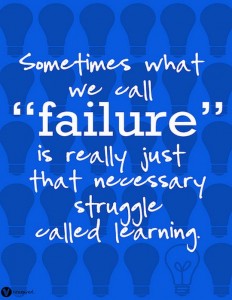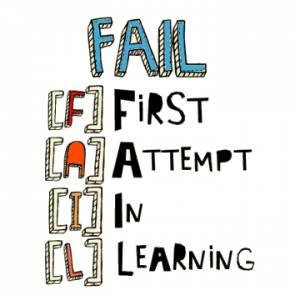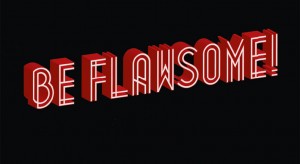This post was cross-posted on YUEducate.com, where the theme for this month’s blog was vulnerability, which I connected to the idea of failure. I see failure as strongly related to vulnerability, as only when we feel comfortable being vulnerable do we feel comfortable failing.
Failure is a topic I love to think and write about. In fact, I’ve blogged about failure before, the IDEASchools Network Facebook page dedicates each Friday to Failing Fast, and I love all the threads on JEDLAB devoted to the topic, one of which took place quite a while ago. More recently, Jane Cohen’s post on JEDLAB, on Brene Brown’s book Daring Greatly has generated close to 300 comments. Though the book isn’t about failure per se, it elicits contemplation of making mistakes, centered as it is on vulnerability and shame and what it means to have the courage to expose oneself.
The older JEDLAB thread on failure included a discussion of whether to use the word failure at all anymore. If failure is indeed a good thing, maybe we need a more positive term for it. In fact, in Crazy is a Compliment by social entrepreneur Linda Rottenberg, the author describes the culture at the WD-40 Company, a company whose founder created the famously effective anti-rust solution through a series of fail forward experiments:
In deference to its origins, the CEO, Garry Ridge, has made failure central to the company’s daily operations. All of the firm’s three hundred employees are encouraged to share both the positive and negative outcomes of every situation. “There is no penalizing for lack of success,” he said, no whack-a-mole culture where the minute someone tries something new and comes up short, he or she is beaten down by others. “At WD-40 Company, we don’t make mistakes,” Ridge said. “We have learning moments. We give people permission to have a conversation about things that go wrong” (140).
We have learning moments. What a great way to describe the iterative process by which anything — acquiring knowledge, trying out new ideas, and experimenting — is accomplished. It would be great for schools to debate whether they want to keep calling failure failure or employ the term learning moments. As the JEDLAB thread showed, sticking to the term failure is useful, as it leads to the realization that the road to success is non-linear and includes mishaps and defeats.
In fact, Linda Rottenberg also mentions India’s famous business leader Ratan Tata, who embraced failure as a valuable organizational tool late in his career. In his last year as chairman of a conglomerate of over a hundred companies, Tata launched an unconventional competition: a prize for the best failed idea. “‘Failure is a gold mine,’ he is quoted as saying. It’s the only way to foster innovation, keep the company fresh, and reward employees for trying new things. Rottenberg concludes the section on failure by suggesting: ‘[E]very now and then go out of your way to give someone an A for getting an F.’”(141)
On the other hand, other benefits may accrue from using the term learning moments. Doing so makes me wonder what schools would be like if students thought of time there, not as an anxiety-ridden drive to final and sometimes disappointing grades, but as an opportunity to partake in learning moments that move them to greater and deeper comprehension and mastery of skills and information. As a practitioner and proponent of project-based learning, of course, I’d add that evidence of learning should be products and events that students create and that are connected to the real world.
Simply employing the more positive language of learning moments allows us to shift our and our students’ mindsets into ones of growth and possibility. The term failure may be miring us all in a fixed mindset, one which prevents us — no matter how many times we may say F.A.I.L. = First Attempt In Learning — from feeling properly empowered to learn from our mistakes.
So, it might be worth it to take the time to convert failure into a positive term, but it might be more effective to adopt new language about failure altogether.
Though the start-up culture around us — dissected in Crazy is a Compliment and the famous start-up manifesto The Lean Start-up by Eric Reis — and Carol Dweck’s fascinating and important research on growth and fixed mindsets are making us believe we’re revolutionizing the concepts of success and failure, the truth is, of course, ein chadash tachat ha-shemesh, there is nothing new under the sun.
I recently returned from an amazing trip to Israel, where I visited my son who is studying at Yeshivat Ma’aleh Gilboa. We had the opportunity to learn together, and one of the things I took another look at was Dr. Avivah Zornberg’s book, Genesis: The Beginning of Desire. Dr. Zornberg reminds us that of all the works of creation, which come about when God speaks, only man is fashioned by God’s hands. Dr. Zornberg writes:
What does it mean, to be created by the hands of God, rather than by His word? Man comes to be differently, it seems. Even before God breathes the breath of life into him, the circumstances of his physical making are radically different. It is no longer a matter of the water’s swarming spontaneously with new life (Genesis 1:20), or of the earth’s “bringing forth” animal life (1:24), in response to God’s word . . . . There, God’s word is all-powerful: it constrains chaotic possibilities into the desired shape and posture. In such a hegemony of the word, it would be absurd to conceive of rebellion, or even dialogue. . . .
Quite different is the imagery of the potter and his clay [as it seems God is when He makes man]. Here is surprise, rather than the inevitability of God’s power. In all creative work (the word la’asot, “to make” [used when God makes man], is central in this passage), there is play between the artist and the material. The characters of the novel begin to talk back, to declare their own reality and destiny. . . .
In the Creation narrative, God “changes his mind” about the work of His hands — and destroys the world. Just before the Flood, the Lord regretted [va-yenahem] that He had made man on earth, and His heart was saddened” (6:6). The anthropomorphism here is most poignant: but it is an organic outgrowth of the imagery of the artist, who projects but cannot control this one part of his work that is made ba-yadayim — “with his hands. . . .” There is a relation of the hands to the work, which is the contrary of everything abstract and detached. It is the relation of loving involvement, the mutual vulnerability to surprise and failure, the power and risk of making [my italics]. (18-19)
How fascinating to view God as a bit of an entrepreneur, taking a risk and diminishing His own power by making a creature who can talk back and not act according to His will. When the men He makes turn out to be devastatingly cruel, He does not view His creation as failure, but rather keeps iterating, based on His original prototype. I don’t mean to dehumanize man in this interpretation. Indeed, Dr. Zornberg adds that man is more than a prototype; he is an artistic work lovingly fashioned by a God much interested and invested in his moral progress.
The point of this entrepreneurial interpretation of Genesis is to show that the Jewish tradition, too, celebrates failure. Even God “fails” — and thank you to Rabbi Steven Penn of Yavneh Academy who reminded me recently that, according to midrash, God made and created many universes before completing the one we are in — , and even God is saddened when He does not succeed.
It is hard to fail. It is even sometimes hard to have learning moments, particularly when they involve personal pain, regret or disillusionment and particularly when one fails at something they feel personally invested in, that is the “work of their hands.”
But the language of the start-up culture — a language we can find in our own tradition — is wonderful in leading us out of the wilderness of despair that negative views of failure can make us inhabit. Instead, we discover more positive, growth-oriented ways of looking at making mistakes. And I think it’s not only imperative our students feel comfortable with erring and being flawed. Gone are the days when educators need to know it all. We are just as much on a learning journey as our students are, and we need to feel okay with being, as Linda Rottenberg says, “flawsome”: flawed and awesome.














Leave a reply
You must be logged in to post a comment.